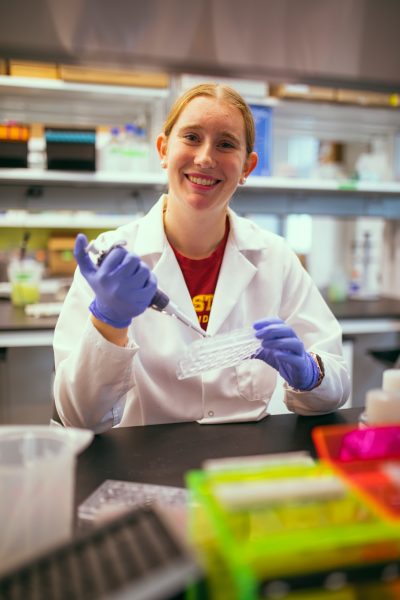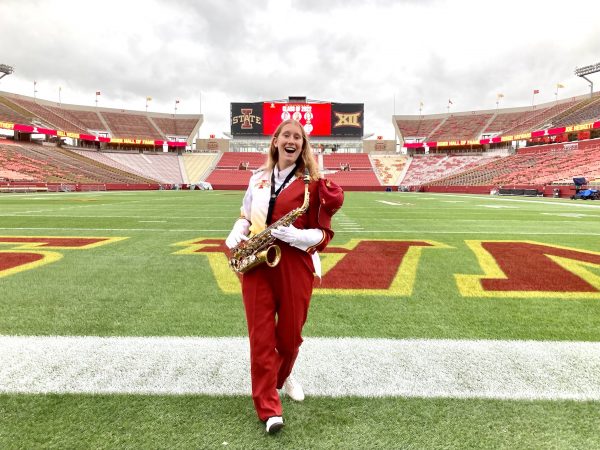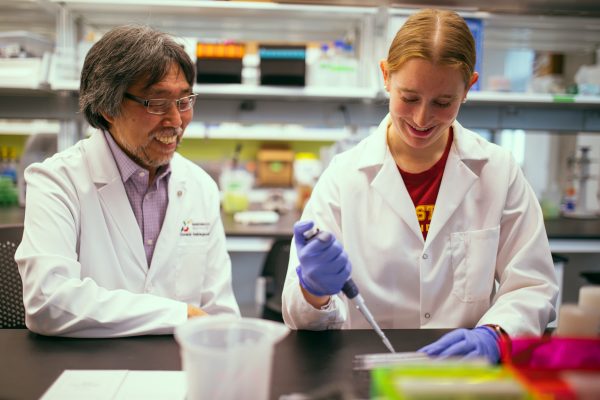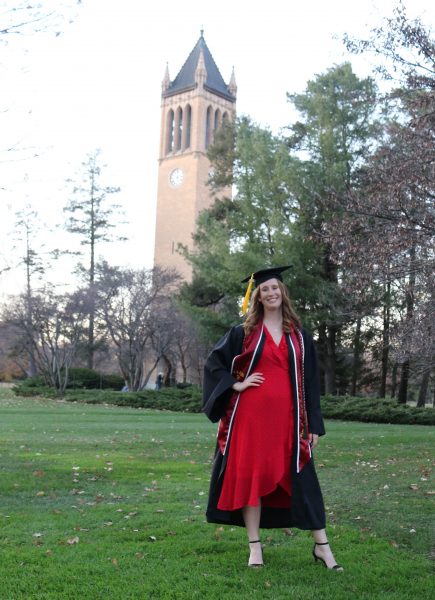A physician in the making
Author: Stacey Maifeld
Author: Stacey Maifeld

During the summer after her sophomore year at Iowa State, Anna Garbe (’22 biology) shadowed an OB-GYN and observed a cesarean section.
“I didn’t know anything could be that cool. I swear I blinked, and the OB-GYN had the baby in their hand. I’m like, ‘Where did that come from? That can’t be a real baby,'” she recalled.
Interested in health care, Garbe had been exploring career options that summer. She said the rigor and time commitment involved in medical school previously seemed scary, but the operating room experience gave her a new perspective.
This fall, Garbe graduates from Iowa State as a stellar student, an LAS Dean’s High Impact Award for Undergraduate Research recipient, an alto saxophonist in the Iowa State University Cyclone Football ‘Varsity’ Marching Band – and a future doctor. Next fall, she will attend the University of Iowa Carver College of Medicine.
Growing up, Garbe experienced the importance of healthcare systems and patient care up close. Her younger sister is missing one arm below the elbow, she said, and Garbe often accompanied her sister to appointments. Her dad also works in information technology at the University of Iowa Hospitals, and she visited him occasionally at the hospital campus.
In high school, Garbe began volunteering at her local hospital, where she loved the team atmosphere and diverse environments, from the nursing units to the ER. Later, she became a certified nursing assistant at a nursing home.
Then at Iowa State, she found the opportunities and support to turn her passion into a profession.

A native of Cedar Rapids, Iowa, Garbe said she had been nervous about attending a larger university until she tagged along to Ames during a high school friend’s campus visit. Exploring Iowa State by herself, she said she felt right at home.
“It was the feeling of walking around and saying, ‘Okay, I could see myself here,'” she said. “I also realized how many more opportunities you have at a large university, like marching band and all the different research labs.”
Those feelings proved true. Garbe has been a marching band member for four years – representing Cyclone Nation during two bowl trips, she proudly noted – and an undergraduate researcher in a neuroscience lab run by Donald Sakaguchi, Morrill Professor in the Department of Genetics, Development, and Cell Biology.
Garbe has also volunteered at the SHOP Food Pantry on campus, served as an LAS ambassador, and participated in campus organizations like Cardinal Swing Society and her band service sorority. She even studied abroad in Paris with the Cathedrals of France program – while writing medical school applications on morning train rides.

In the Sakaguchi Lab, Garbe conducted research using a novel blood-brain barrier model. With this two-well microfluidic device, she helped culture neural stem cells on one side of the device and applied different neurotransmitter drug treatments on the other side. These neurotransmitters, such as dopamine and serotonin, were chosen to test their effect on the cells, evaluate different concentrations, and improve the model. This research provides insight into how neurotransmitters affect neural stem cells and could lead to developments for treating traumatic brain injury or diseases such as Alzheimer’s.
“Anna has been a great lab and team member,” Sakaguchi said. “She’s an all-around outstanding student – responsible, hardworking, has a great attitude and is always willing to help her lab mates. Just the type of student you want to have in your lab and classroom.”
Garbe said the best part was seeing how research progresses through many detailed steps. Sometimes, she would individually click on as many as 1,000 cells in a field to measure how many were alive.
“I like learning how extensive the process is,” she said. “From designing the experiment to quantifying it at the end. You get to see the huge process and what goes into the different scientific findings you read about in textbooks.”

While Iowa State is a large university, Garbe said its smaller pre-med population gave her distinct advantages, such as increased access to opportunities and stronger personal connections.
“The Pre-Med Club is super supportive,” she said. “We have practice MCAT days, and the first semester I had an upper-level student mentor that I could meet with.”
The OB-GYN specialty continues to interest her, but Garbe said she’s also open to exploring other options in medical school to learn what she enjoys. That’s also the advice she gives future Cyclones at Iowa State’s pre-health sessions.
“My biggest advice is always to do what you enjoy,” she said. “Don’t try to check the boxes. Your path will be different from everyone else’s path. If you do what you enjoy and find your passion in medicine, you’re on the right track.”